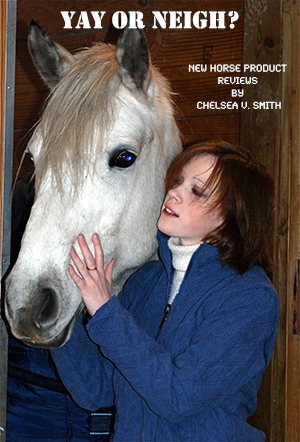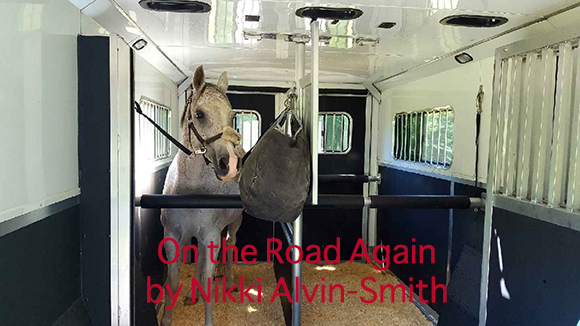On the Road Again
by Nikki Alvin-Smith
Warmer temperatures and options to train and show down South lure many equestrians and their equines to warmer climes during the winter months. While you may be tempted to transport your horse yourself there are many good reasons to use a professional.
Who should you select? To start with experience handling and driving horses with modern, well-serviced equipment is very important. It is imperative to check that the company is also insured and licensed which means you need to check the validity of their D.O.T. number. There is a wide choice of carriers so should you choose a large trucker or a smaller more personal service? I have had experience using both in the domestic and international arena and there are pluses and minuses to be considered.
We interviewed Ryan Chiappone, owner/operator of Eastern Equine Transport L.L.C, based in Canandaigua, New York to discover what their East Coast service provides and glean some advice on what the consumer should expect and how the horse owner can help make the trip the most successful and stress free.
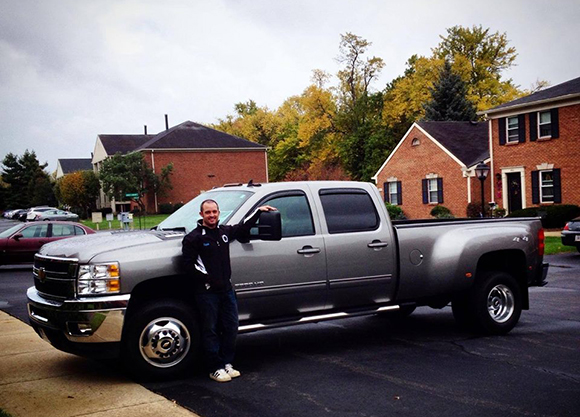
CH: What is your favorite thing about being on the one road with horses in tow?
Ryan: I would have to say the horses and people I meet and the barns and facilities I get to see. Making my own hours, my own business decisions and having the freedom to travel when I want and where I want isn’t too shabby either. I also get a lot of me time with animals that I am passionate about and enjoy being around.
CH: What drives you (lol), to work these long hours and handle horses?
Ryan: I think the best thing in the world for me is to see a happy horse walk off the trailer to a smiling owner. The most stressful thing for a horse owner, myself included, is entrusting the safety and care of your horse to another person. For most people it’s very hard to do. A successful run is the best feeling of accomplishment for me.
CH: Any advice for anyone thinking of driving their own horses versus hiring a professional?
Ryan: Call and speak to a professional before hauling horses over long distances. They can give you advice on routes to take, where to layover, how to make the trip as stress free as possible, what to do if there is an emergency. They can help go over the risks to your horse during a long trip and potential issues/solutions they’ve encountered. By the time you are done talking with them you will have probably decided to hire a professional rather than doing it yourself.
CH: Any advice to help people select their best option for a good experience for them and their horse?
Ryan: Ask a lot of questions and do your research. How often are horses checked on? Will there be a layover? How long is your horse expected to be on the trailer? What’s the approximate drop off day and time?
Don’t always go with the cheapest shipping rate. Good and reputable haulers are averaging $1.25 to $3.50 a loaded mile which is often based on the type of horse being hauled, the distance, the trailer space requested and special needs outlined by the owner. Check to make sure they have a DOT number.
Check and see what other customers have experienced with your chosen shipper.
CH: What is the funniest/happiest thing that has ever happened to you when you are out on the road?
Ryan: Using a miniature pony to coax a 16.3hh warmblood that was afraid to load onto the trailer. It actually worked! I almost took the mini home and put him on staff!
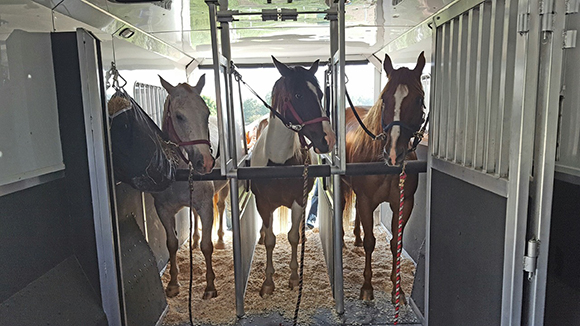
CH: What are some of your pet peeves about making the pick-up and delivery easier?
Ryan: Owners who aren’t ready when we arrive for pick and a lack of information. Shippers are often on a tight schedule and shippers operating under DOT restrictions have a certain amount of time they are allowed to be on the road. Having tack, equipment and feed ready to go is extremely important.
Be open and honest with how your horse loads, its behaviors while trailering and especially if your horse has any dangerous habits or medical issues. Shippers can arrange extra time for horses that are difficult to load. If they are nervous travelers shippers can take precautions to help make the trip safer and maybe even a little less stressful. If there is a preexisting medical issue shippers can arrange a vet to meet them at the layover barn or be on the lookout for symptoms associated with the disclosed medical condition.
CH: What makes a smaller operator like Eastern Equine Transport a better option than a major carrier?
Ryan: Small shippers like me can give your horse(s) more personalized attention.
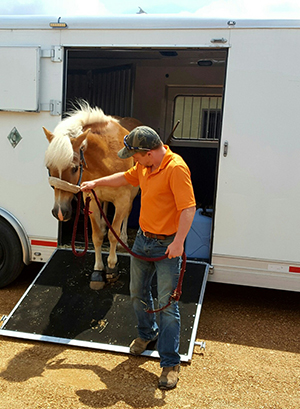 Carriers using large rigs can ship 15-20 horses at a time. They can sleep in their tractor bunks on the road and can travel further on a tank of gas. They make more stops to pick up and drop off horses. If the pick up or drop off location is on a road that isn’t accessible to an 18-wheeler then you end up driving to meet them somewhere. Some large haulers require you to meet them anyways so they don’t have to divert from their main travel route. This is not to say that all of this is a bad thing, there are very good commercial haulers using “big rigs”.
Carriers using large rigs can ship 15-20 horses at a time. They can sleep in their tractor bunks on the road and can travel further on a tank of gas. They make more stops to pick up and drop off horses. If the pick up or drop off location is on a road that isn’t accessible to an 18-wheeler then you end up driving to meet them somewhere. Some large haulers require you to meet them anyways so they don’t have to divert from their main travel route. This is not to say that all of this is a bad thing, there are very good commercial haulers using “big rigs”.
Smaller haulers though, have to stop more often for fuel and like me make a quick health check each time. Smaller haulers can bring hay and feed along so your horse doesn’t have to switch to something different while in transit. This is an infinitely more difficult task if you have 15-20 different types of hay and feed to sort through on a commercial tractor-trailer. It’s also easier to spot medical issues when you have less horses on the trailer.
We will pick up and drop off less. Smaller haulers can often ship address to address so you don’t have to meet them somewhere to pick up your horse. If your horse has any special needs it is easier for a smaller shipper to accommodate them.
Most importantly, a smaller shipper will most likely need to layover. This means your horse can get off the trailer, eat, drink and roll. A layover allows your horse 8 hours to lay down and de-stress. Most importantly it gives them 8 hours to rehydrate. Most horses don’t drink while in transit due to anxiety. After 10-12 hours, time off the trailer is a welcomed relief and so is a full bucket of water. Being able to move around a stall versus being in a confined straight stall also helps horse mobility and stiffness.
CH: Can you walk us through an East Coast trip in the life of Ryan - maybe include the pick-up, days between and the drop off.
Ryan: Our day typically starts around 5:30 a.m.-6:00 a.m. on the road heading to the first pick up. Once horses are loaded up with correct feed and hay we get on the road heading south. We typically stop every 3-4 hours, depending on fuel needs and horses travel experience, for a health check. We take a bathroom break and grab a bit to eat if needed too. Depending on how many horses are going south, or north, additional health checks can be done at a pick up or drop off address.
We typically keep our road time to about 10 hours of driving with 1-2 hours dedicated to stops. I usually have a layover barn and hotel prescheduled prior to the trip. When we arrive at the layover barn the horses are off loaded and settled into their stalls with hay and water. A visual check for any health issues is done and then each horse is fed a pre-packaged feeding set up and provided by their owners. Once horses are settled in the trailer is cleaned and fresh bedding is added as needed.
At this point we head off to check in to our hotel room and grab dinner. Most all of our layover facilities do a night check for us but if not we will do night check ourselves after dinner. Once this is done it’s time for a shower and to decompress with some TV and sleep. We are back at it by 6am though. Horses are fed and loaded onto the trailer for the final leg of the trip south. Horses going into Florida can usually be dropped anytime between 2 p.m. and 6 p.m. depending on traffic conditions and how far south into Florida they need to go.
Once horses are dropped off we settle into a hotel for the night and go over a quick plan for picking up horses to go back north. The process repeats itself all over again until we are back home.
Once I know pick up and destinations for our trips I set up our route and plan our stops, including pick-ups, drop-offs, layover locations and hotels. This helps us stay on schedule as well as efficient and punctual.
CH: What can people do to help ensure their horses have a positive experience?
Ryan: Know your horse and be honest about his/her behaviors and quirks. Let your Shipper know in advance if there are any concerns that they need to look out for. Consult with your vet about helpful supplements or precautions that you can take prior to shipping your horses over long distances.
Eastern Equine Transport offers services up and down the East Coast including into Canada. Their equipment is up to date and offers good versatility for loading, adaptive stall sizes and custom needs. Ryan Chiappone is a professional horseman and has experience breaking out horses as well as competition experience in the Western disciplines.
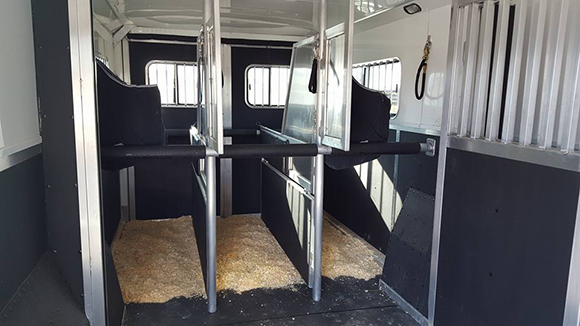
It is important to be talk directly with the trucker you choose and that you feel a hundred percent comfortable with their references and their attention to detail and customer service. As Ryan suggests, don’t be shy to ask lots of questions and do check out their insurance through their D.O.T. number and ensure that it is current.

